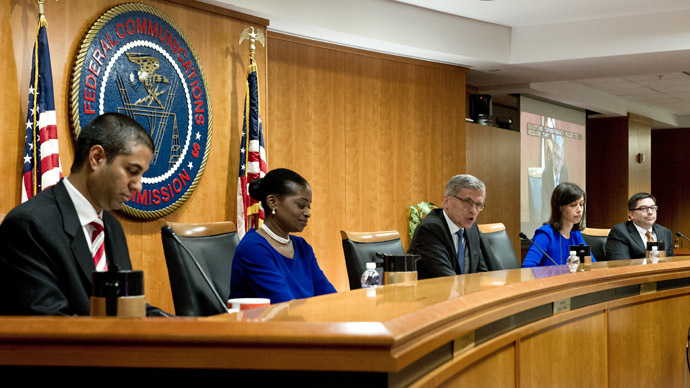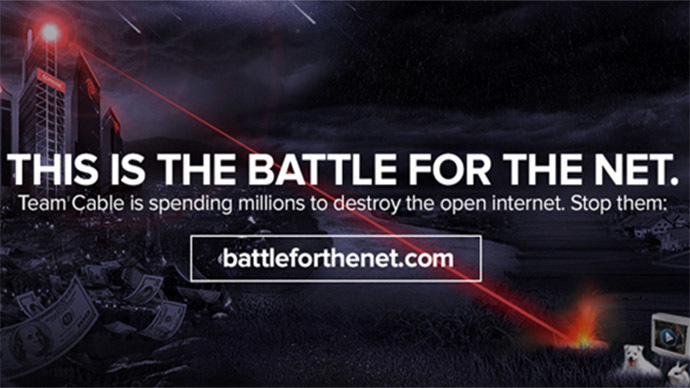‘Internet to be no longer a place where everyone has a voice and every link is equal’

Consumers and companies will be hurt by FCC plans to roll back Title II protections that means that the Internet will no longer be a wonderful playing field where everyone has a voice, activist Liz McIntyre told RT.
On May 15, 2014 the US Federal Communications Commission (FCC) proposed a plan that would enable Internet service providers to charge extra fees to content companies like Google for preferential treatment. Under these rules, big telecom companies like AT&T, Verizon and Comcast would be able to create a two-tiered Internet, with “fast lanes" for those who can afford it and “slow lanes” for the rest. This is considered to be an attack on people’s rights to freely connect and communicate. Till now net neutrality remains the Internet’s guiding principle, which prevents discrimination. The advocates of this principle are calling on the FCC to reclassify Internet service providers (ISPs) as common carriers under Title II of the Communications Act of 1934 that would allow them to protect net neutrality by regulating against paid prioritization.
RT:What is this planned reform and what's going to change?
Liz McIntyre: Unfortunately, there are plans afoot by the FCC which would like to roll back Title II protections for the Internet, which means that they see a world in which the Internet is no longer a wonderful playing field where everyone has a voice. By rolling this back they would put the power over the Internet into the hands of a very small group of very powerful people, namely the telecommunications companies – AT&T, Verizon, Comcast and of course the FCC. That could have serious implications for consumers.
RT:How slow will online surfing be if your refuse to pay extra?
LM: That is an interesting question. There are so many things that we do not know right now that we would like to know, and we are simply not getting answers. The vision is that when Title II protections are no longer there, then it will be up to the organizations in charge to decide exactly who gets what service and how fast this service will be. There is in vision a “fast lane” for those who will pay an extra premium and a “slow lane” for those, the average consumer, who is now in a pretty plain situation with all the big companies and everyone else, they have a voice just like the big companies do.
RT:How could this affect the economy and businesses relying on fast access to online data?
LM: It depends on in what business you are and how much money you have. If you have a lot of money and you are in the hip pocket of the FCC or anyone in Congress, perhaps you have a good relationship with one of the big telecom companies; you are going to have the fast access you want. And we foresee companies that are going to be using RFID tags, that are a layer on top of the Internet, probably get very fast speed, paying for extra fast speed, so that they could track, for example, RFID tags as they move around the world. But the average mom and pop who is trying to start an internet business on a shoestring, even some of the companies we’ve come to know and love, companies like startpage.com, like private web search service; ETSY - great organization that allows people from around the world to produce products and sell them around the Internet; NameCheap – a name registration service. I can go on and on with the companies that could be negatively affected by this and of course they are negatively affected by these companies that we love and we use. The consumers are the ones that are going to pay the price.
RT:What's being done to stop the reform?
LM: There is a very big movement afoot today here in the US and around the world actually, all gathering together for an Internet Slowdown Day. We want to let everyone in the world know what could possibly happen if Title II protections are rolled back. We want people to know that they could possibly lose fast or reasonable connections to the services they love and there is not really much they will be able to do about this. We want to let companies know, who may not yet know, how they can be affected, how they can be put out of business, shuttered, basically their websites could take forever to load, and who is going to wait around for a website to load? Of course the people with the money who are going to have fast load times to deliver their sales messages. Those people with the advantage over the other ones who will win in that world but most of the people on the planet, especially consumers, are poised to lose.

RT:How close are corporations to the government body which regulates online issues?
LM: Very close, it’s a revolving door basically of government officials from the FCC going out to private lobbying firms that work on behalf of the telecommunications companies. I have a list of those people, it is too many to even go through completely but I will tell you a prominent person in this whole struggle is Tom Wheeler, who is currently the Chairman at the FCC and he was appointed in 2014. Just an example of him alone is very troubling. Tom Wheeler is a former President of the NCTA (National Cable and Telecommunications Association); one of the organizations that are of course fighting for roll backs of Title II and loves the idea of “fast lanes” and “slow lanes.” He was also a former CEO of the CTIA (Cellular Telecommunications Internet Association), which is a wireless industry group also very interested in pushing through these “fast” and “slow lanes” that are going to hurt consumers and small businesses.
RT:Reports say many government employees leave for big companies. Isn't that a conflict of interest?
LM: It is hard to believe in this day and age that this could possibly happen, that there has been such a close relationship among people, this is revolving door when they seem to be playing musical chairs just like when the music stops in a government agency and when the music starts again they roll around the ones in the lobbying group – it is crazy. Approximately 70 percent of the lobbyists for the AT&T, Comcast and Verizon previously held government positions.
RT:What particular actions do you plan to take? Why is it that important?
LM: We take action, we let the FCC know, we let our representatives in Congress know, we let the US President know that we want the Internet, the free place for communications that it has become, the place that we have to rely on, has become a public square, become our place, where every man and every woman can be heard and they won’t be shut out, unlike in some other situations where people have very limited access. On the Internet everyone has an opportunity, everyone has a voice and every link right now is pretty much equal. So we need to fight back, we need to join together today and make sure we go to website sponsoring ways to contact representatives, battle for the net.com as one, fight for the future. Go there, voice your concerns! We can save the Internet if we are all together.
The statements, views and opinions expressed in this column are solely those of the author and do not necessarily represent those of RT.
The statements, views and opinions expressed in this column are solely those of the author and do not necessarily represent those of RT.












